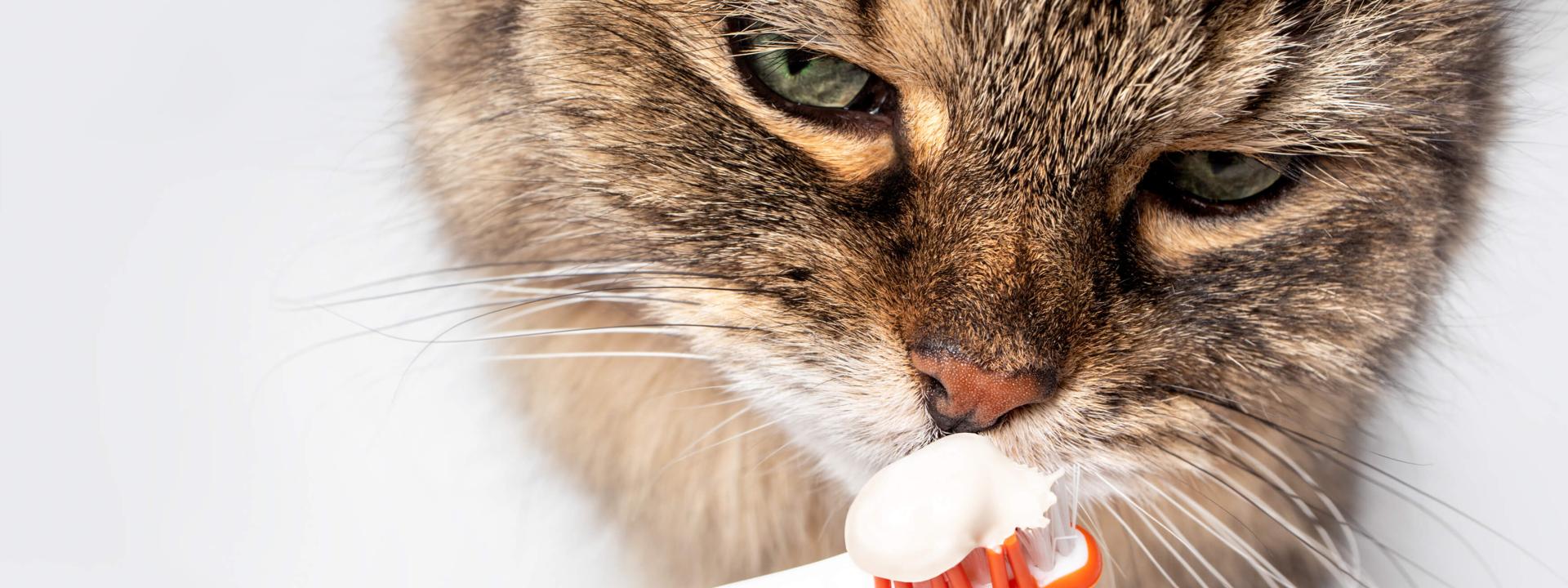Cat dental care certainly isn’t the most exciting topic we veterinarians care to chat about with pet owners. On the other hand, we understand just how crucial a contribution this is to overall cat wellness. We also see firsthand the extremely negative and sometimes painful effects of a less-than-stellar (or no) cat dental routine.
It’s also vital to remember that cats are very stoic when they’re not feeling well, and what many pet owners don’t realize is just how painful a cat’s mouth can be when dental care has been neglected. We know you love your fur babies and want them to live long, happy, healthy, pain-free lives, so we’ve taken the time to round up some valuable information on cat dental care and shared it with you below.
How can I keep my cat from getting dental issues?
Since cat dental care is possibly the most overlooked area of small animal medicine, you must take your cat in for a yearly checkup and exam with your veterinarian. During this exam, they will closely evaluate the mouth and teeth for any abnormalities, like fractured teeth, gingivitis, plaque, bad breath, and more. We recommend feeding your cat dry food unless otherwise specified by your veterinarian, which can help mechanically break down plaque formation on the teeth. Brushing your cat’s teeth can also help prevent dental issues, although many cats are not so tolerant to brushing. There are also many other products out there for dental care in cats. We recommend checking VOHC.org for the recommended list of products.
Why are my cat's teeth so yellow?
As your cat ages, some yellowing and staining of the teeth can be normal. Keep in mind, though, that yellow discoloration could also indicate plaque formation, a decaying tooth, or other underlying dental disease and should be evaluated by a veterinarian.
Why does my cat's breath smell so bad?
Bad breath, also known as halitosis, is usually one of the first underlying dental disease indicators. The cause of the bad breath is usually from bacteria that can live in the mouth and under the gums. It could also indicate a tooth root abscess or other problem in the mouth. If you notice bad breath, we recommend having your cat evaluated by a veterinarian to determine the cause. They may recommend a thorough dental cleaning to assess the mouth and treat any underlying dental issues fully.
Can I keep my cat's teeth clean without brushing?
Yes! Many cats do not tolerate brushing their teeth. The simplest thing you can do is feed dry food and hard treats, which help to remove plaque formation on the teeth. There are also other approved products for cat dental care, such as water additives, dental chews, dental treats, and even prescription, dental diets. The Veterinary Oral Health Council has created a list of approved products for your cat's dental care. Visit VOHC.org for a full list of products.
How can I make cleaning my cat's teeth at home easier?
When attempting to brush your cat's teeth at home, it is best to start slowly and only for short periods of time. You can use a Q-tip to run along the gum line daily. Try and make these experiences as positive as possible, and stop if you notice your cat getting stressed. You can also use treats as positive reinforcement. As you get your cat more comfortable with this, you can start to transition to a pet toothbrush and toothpaste and brush for longer periods of time. Remember that human toothpaste should never be used because it can be toxic to cats. Pet toothpastes are safe and come in a variety of flavors that may be appealing to your cat.
Why does my cat need veterinarian dental care, and how often?
Veterinary dental care is important because a significant portion of dental disease happens below the gumline. This area cannot be reached by a toothbrush and requires anesthesia and special instruments to clean. Regular dental cleanings started early can help prevent a variety of other illnesses. We recommend dental cleanings start around 3 to 6 years of age, depending on your cat's dental disease, and that they occur yearly. Since genetics play a role in dental disease, your veterinarian may recommend starting dental cleanings earlier and more frequently.
What are some illnesses associated with lack of cat dental care?
Untreated dental disease can be a very painful condition. Many cats will continue to eat despite significant oral pain, so do not assume your cat's teeth are okay if they are still eating. Inflamed gums, fractured teeth, tooth abscesses, and other painful conditions can occur in the mouth, often leading to extraction (removal) of one or several teeth. Dental disease can also allow bacteria to enter the bloodstream, resulting in heart disease, kidney disease, or liver disease. Regular dental care can prevent many of these illnesses in cats.
Whether you’ve noticed some signs of trouble in your pet’s mouth or you want to prevent issues before they begin, we recommend scheduling an appointment with your veterinarian to discuss your cat's dental care.

